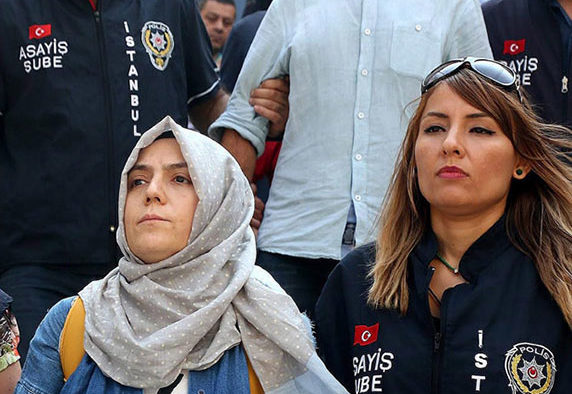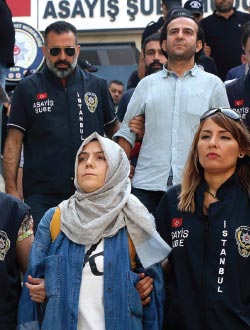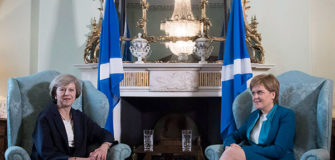“The events in Turkey…

Katerina Dalacoura
…set off an explosive series of developments, and significantly complicated the saga surrounding its strongman, Recep Tayyip Erdogan. A coup was attempted by sections of the armed forces, but it failed through a combination of its own organizational shortcomings, the fending off by the army and security forces, and popular mobilization against it. Firm culpability for the attempted coup is yet to be established. Die-hard Kemalist elements may have been behind it, but the government was quick to point the finger at Fethullah Gulen, who leads a religious association with deep historical roots in the country, and with whom, since 2013, the AKP government has been locked in a power struggle.
The implications of the attempted coup for Turkey’s domestic politics will be – in the medium term, at least – damaging and destructive. The act itself, albeit illegal and unpopular, was a symptom of the powerlessness felt by segments of Turkish society against the seemingly inexorable rise of Erdogan and the stranglehold that his party has put on the country. Turkey has always been steeped in conspiracy theories, but the divisions and hatreds of the past few years have exacerbated them. The government feared a coup and it has happened, stunning most Turkey observers who believed that the era of military intervention was long gone. This will only increase the government’s paranoia. Tens of thousands of army and security personnel, civil servants, teachers and academics were immediately suspended from their jobs for no other reason, it seems, except being associated in some fashion with government opposition. This egregious violation of the letter and spirit of the rule of law does not bode well for the future of democracy in Turkey.
However, that the attempted coup will augment Erdogan’s power may in the long run play a part in his undoing. The fact that all of the political parties in Turkey, and most of the population, took a stand against the coup will probably be seen by him as providing carte blanche for his political ambitions – to a stronger presidency, for example, and to other ways of amassing power – but in fact it only reveals rejection of military solutions to the country’s problems. The president does have robust support in the country, but not all who vote for him are diehard enthusiasts. Erdogan is not the AKP, and Turkish politics cannot be reduced to his person and fate. Following a period of instability and score-settling, a return to normality may well reveal a more unified political class and a more mature electorate. We must remember that the power struggle currently gripping the country after the coup between the government and its opponents – above all the alleged Gulenist conspirators – is but one problem facing Turkey. The Kurdish issue – the country’s longest and deepest challenge – is unresolved and currently wreaking havoc. More concentration of power in the executive and in Erdogan personally will surely make it more difficult to address the complex set of problems facing Turkey – including the economy – and this will have a political cost in the long run.
Internal instability and purges in the army and the security forces do not bode well for Turkey’s ability to deal with the Syrian civil war and the Iraqi turmoil at its doorstep. However, they may also push Turkey to negotiate in Syria.
As for Turkey’s foreign policy and external relations, the attempted coup presents grave dangers, but also possible opportunities. Internal instability and purges in the army and the security forces do not bode well for Turkey’s ability to deal with the Syrian civil war and the Iraqi turmoil at its doorstep. However, they may also push Turkey to negotiate in Syria – something that may have been in the cards already in the weeks before the attempted coup and the thaw in Turkey’s relations with Russia and Israel. The tension with the EU over the death penalty, and with the US over Fethullah Gulen’s extradition, will most probably die down as nerves begin to calm.
Turkey is in the throes of many struggles – ethnic, political and ideological alike: between the AKP/Erdogan and their opponents, between Turks and Kurds and, in the eyes of many, between Islamism and secularism. But the overriding issue, subsuming all of the above and defining the country’s domestic politics and foreign relations, concerns democratic institutions and the rule of law. The establishment of a democratic and liberal model of resolving conflict, negotiating differences and reaching consensus is the only way for these struggles and others to be resolved. The attempted coup and the backlash that it has unleashed are a step backward in the country’s democratic evolution, but Turkey can still snatch victory from the jaws of defeat.”
» Katerina Dalacoura is Associate Professor of International Relations at the London School of Economics.
Andrey Kortunov
…demonstrate once again the dangerous fragility of the state system in the Middle East and North Africa (MENA) region. The hundred years following the collapse of the Ottoman Empire did not produce a stable and lasting modus vivendi among the former constituent parts of that empire, or indeed within those parts.
Turkey used to be the cornerstone of political stability and economic progress in the region, serving as a model of modernization for many neighbouring countries. But the country has turned out to be vulnerable to domestic upheavals, on top of being a major target of international terrorism. The apparent ease with which President Erdogan was able to handle the attempted coup should not mislead anyone: the political future of today’s Turkey remains highly uncertain, the country is deeply divided on many critical matters, and the aftershocks of recent events will be felt in the entire region for many years to come.
What can external powers do to mitigate the turmoil in the region? To be sure, any external involvement is likely to have only a marginal impact on key regional countries like Turkey, Egypt, Saudi Arabia and Iran. However, a new concept of regional collective security proposed by the international community might help to limit the international repercussions of domestic crises like the one that took place in Turkey, and provide for a regional ‘straitjacket’ capable of preventing the proliferation of instabilities (see the Feature article by Sam Sasan Shoamanesh in GB’s Fall 2012 issue). The ‘P5+1’ formula that turned out to be surprisingly efficient in dealing with the Iranian nuclear question could be considered as a model here (with appropriate modifications). In any case, it is critically important to ensure that all of the external players are not part of the problem, but indeed part of the solution in the region. This has not always been the case to date.
The failed coup may well accelerate the recent Russo-Turkish détente – especially in light of new complications in the relationship between Ankara and Brussels. The consolidation of Erdogan’s personal power, ongoing purges in Turkish universities, the media and the judiciary, and suggestions that Turkey might reinstate the death penalty – all of these developments only serve to deepen the differences between Turkey and the EU. Moscow therefore appears to be an important partner of convenience for Erdogan. However, the key question remains: can Moscow and Ankara reconcile their positions on such complex matters as Syria, the Kurds, Armenia and, among other files, Crimea? To be sure, both Recep Tayyip Erdogan and Vladimir Putin need more Russo-Turkish cooperation, but in order to embark on this path they will have to demonstrate flexibility and a degree of humility, which neither can claim as a principal asset.”
» Andrey Kortunov is Director General of the Russian International Affairs Council in Moscow.
Eyal Zisser
…opened the gate to a much deeper and significant coup or – to be more precise – a significant revolution. This time, the revolution is being carried out by Recep Tayyip Erdogan himself. Erdogan did not hesitate to seize the opportunity to establish his new sultanate by reconnecting Turkey to its Muslim and Ottoman roots and erasing the legacy and secular ideology of the founder of the Turkish republic, Kemal Ataturk.
In his efforts to establish his sultanate, Erdogan is seeking to secure his position and to eliminate any political opposition that might stand in his way. One after another, Erdogan has been taking over all of the bases of power and influence in Turkey, beginning with the judicial system, moving to the media, academia and the education system, and finishing with the police and security forces. Tens of thousands of his opponents have been removed from their positions and/or arrested.
It is no wonder that some Turks believe that the failed military coup was no more than a show staged by Erdogan himself. The fact that the Turkish government has failed to present a coherent and clear account of the attempted coup only bolsters those who believe that this may have been a conspiracy organized by Erdogan.
The failed coup taught us what we already know about Turkey and its president. There is no real opposition in Turkey that can resist the government’s moves to change the character of the Turkish republic. The opposition camp is divided and lacking true leadership. In addition, even those who oppose Erdogan probably prefer his version of democracy to a military regime.
Erdogan’s reputation has turned on his ability to stabilize the Turkish political system and the country’s economy, as well as on his personal charisma. In recent years, however, it seemed as if he had lost his touch, and more and more Turks were tiring of him. The failed coup has therefore played right into his hands.
Erdogan’s regional policy was based on the principle of ‘zero problems.’ Yet in recent years, instead of zero problems, Turkey found itself with zero friends, due to its provocative policies vis-à-vis Egypt, Israel, Russia and Syria. In an effort to ease regional pressures on Ankara, Erdogan recently normalized relations with Israel and Russia. But the coup will now force Erdogan to focus on Turkey’s domestic challenges, and the regional arena will likely have to wait.”
» Eyal Zisser is Vice Rector of Tel Aviv University.












